Winter is on its way, so it time to prepare your caravan or motorhome for the colder and wetter months ahead.
Get advice for continuing touring in winter or laying up your caravan or motorhome for winter.
Even if you still have some winter touring trips planned you’re going to need to protect your ‘van against the effects of damp and frost and be prepared for poor weather.
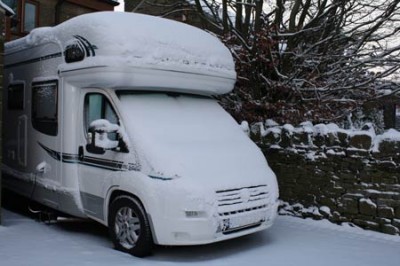
And if you’re planning to rest up your caravan or motorhome for the winter you’ll want to make sure it’s stored securely and safely to protect it from burglars, the elements and to reduce the risk of damp, mildew and corrosion – as well as the damage frost can cause, outside and in.
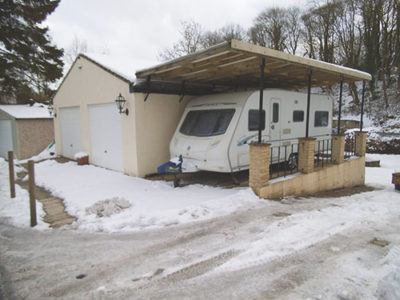
Here are some things you need to consider – whatever the winter weather.
If you’re still touring in winter
- Make sure your tow car or motorhome service record is up-to-date. At the very least, have your battery checked over by your local dealer or garage.
- Check your tyres are in a good condition, correctly inflated and consider fitting winter tyres. These are a legal requirement in some countries.
- Check your oil, coolant and screenwash levels before every trip.
- Make sure all lights are working correctly and are clean – the days will be shorter, so you need your exterior lights in tip-top order.
- Use a maintenance spray on hinges and external sockets to keep things moving and to prevent corrosion.
- Use bowls of salt crystals to soak up excess moisture in between trips.
- Fully drain down the water system between uses so there’s no danger of any water freezing and causing the pipes to burst. It’s a condition of Caravan Guard’s insurance policies to drain down water systems or sanitary systems between 1st November and 15th March when the caravan or motorhome is not use to make sure any such damage is covered.
- Have a “winter emergency kit” in your tow car or motorhome in case you get caught out by bad weather. Include things like an in-car phone charger, ice scraper, spade, torch, warm clothing, gripmats or rubber flooring for muddy or snowy ground, first aid kit and breakdown number. Does your tow car or motorhome breakdown policy include “stranded in mud” cover if you get stuck on a boggy campsite? Caravan Guard’s motorhome breakdown policy does.
Caravan or motorhomes laid up for winter
- Book in for a service and/or get all those little repair jobs done that you’ve been promising to do all year.
Inside look for any signs of water damage, like discolouration or wrinkles in the walls and feel for any soft spots, around windows, doors, vents and any other openings. Always use the right type of sealant to make any repairs, and if you’re not sure, or your ‘van is within warranty, then talk to an authorised repairer.
- Clean and empty the inside of your caravan or motorhome:
Remove all valuables, foodstuffs, empty the fridge and if possible take out soft furnishings and store them somewhere dry at home. Not only will storing cushions away from the caravan make sure they’re in good shape for the new season, it can also act as a deterrent to thieves – a caravan without furnishings is worth much less. Or at least pile cushions in the middle of the floor to get them away from any dripping condensation on the windows.
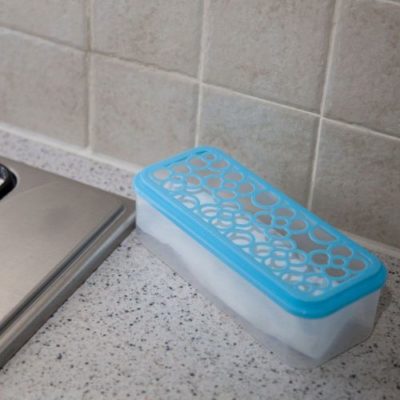
Wipe down walls, keep the fridge door and lockers and drawers open to allow air to circulate, and place moisture absorbing crystals around the caravan.
- Clean the outside
Give the outside a thorough clean and then thoroughly inspect seams and seals inside and out for any signs of water damage, looking carefully for any cracks, gaps or loose/damaged sealant. Inspect the roof, sidewalls, and around windows and doors. Replace any damaged seals.
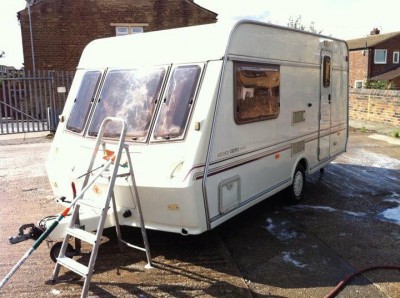
Spray your caravan with an overwintering solution to help repel water, dirt and algae, without the need for a caravan cover.
Check the caravan or motorhome tyres for any cracks, bulges, or other damage and check the tread depth is a minimum of 1.6mm. Look to replace any tyres that are more than five years old when you plan to start touring in the spring or summer.
- Drain down
Completely drain down the water system and sanitary systems, firstly to make sure water does not freeze and crack pipes and fittings, and secondly to comply with your insurance policy stipulations.
Open all interior and exterior taps and allow onboard pumps to run for a short time so get rid of any excess water. Leave them open for the duration of the storage period.
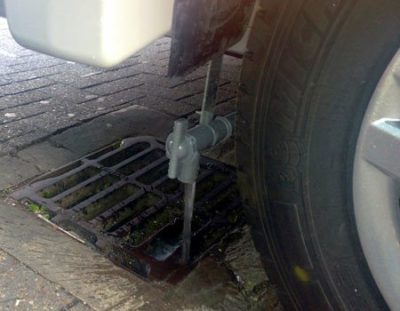
Switch off the pump, empty the waste tanks, drain the toilets and empty the toilet cassette. Apply some maintenance spray to the cassette seal and blade to avoid corrosion or sticking over the winter months.
Leave the shower head hanging and pour a little salt or anti-freeze down the kitchen and washroom plug holes, to avoid any residual water in the U-bends freezing.
- The last gas
Remove and disconnect gas bottles to avoid accidental leakage of gas through the system over winter, and to reduce the risk of fire. Store bottles safely and make sure any taps are turned to the closed position.
- Batteries
Make sure batteries are kept charged, particularly if you need to power an alarm or tracking device. Keep a check on the charge every month or so. Some tracking devices will alert you if power failure has occurred but by then it could be too late.
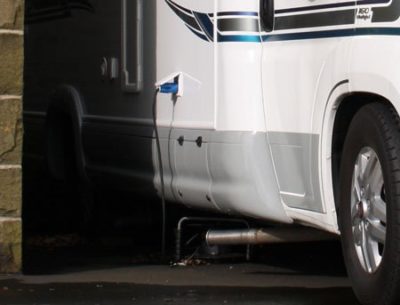
If your unit is stored near a hook-up or mains power supply, then a regular charge will help to keep your battery in a good condition. Alternatively charge it periodically at home.
If you don’t have such electronic security devices and all power is to be turned off in the caravan or motorhome then it’s a good idea to remove the leisure battery and keep it in your house or garage on a trickle charge, so it’s kept in a good condition over the winter.
- Store safely and cover up
A breathable caravan or motorhome cover is a good way to protect it from the elements. Earlier in 2016, 40% of caravan owners said they owned a cover in our caravan cover poll.
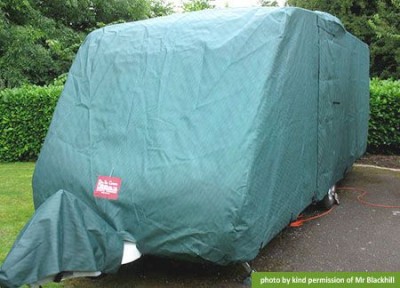
If you are using a cover, get one that fits properly and is breathable – slight chaffing can cause small unwanted scratches on bodywork and windows and you want to keep fresh air in but wind, rain and snow out!
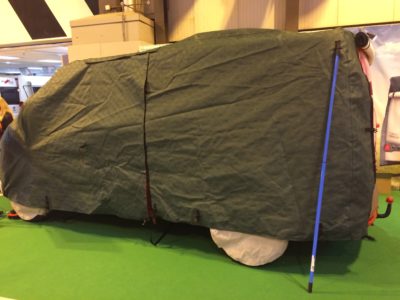
If you don’t have a specialist cover try not to park up under a tree, which could result in sap and debris falling on your ‘van. Also avoid parking under branches, near bushes, or anything else that could cause damage to the bodywork in the event of stormy weather. As mentioned before, applying an overwintering solution will give your paintwork some protection.
- Spread the load
Leaving your caravan or motorhome in the same position all winter could cause a lot of pressure on a single area of your tyres. Therefore, to keep your tyres healthy consider moving the caravan or motorhome a little bit each month. Or jack it up to rotate the wheels.
Caravan winter wheels replace your existing wheels with metal stands. These have the added benefit of making your caravan more secure as it cannot be easily towed away. But for added security make sure the tourer’s normal wheels are stored securely away from the caravan. Or you could use ground anchors to secure your caravan and keep your caravan jacked on an axle to prevent pressure on the wheels.
- Security checks
When your caravan or motorhome is laid up for the winter it’s vitally important all windows, doors, and skylights are locked.
Make sure all security devices are engaged, so your insurance remains valid, and if you have a tracking device or alarm which uses battery power to operate then you may need to keep an external power source connected to avoid these devices running flat, or at least give your caravan leisure battery a regular charge.
Remove any valuable documents like the ownership handbook, insurance certificates and registration documents and keep the caravan or motorhome keys hidden out of sight in your home.
Over to you….?
What steps do you take to protect your caravan or motorhome in winter? Share your tips in the comments box below?


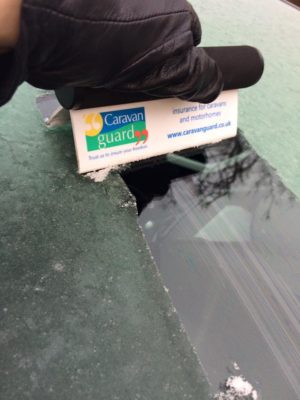
For winter storage – is it necessary to apply grease, WD40 or similar to any parts:wheels, hitch, underframe etc?
As a new caravan owner, found the article and other uses tips an easy read and very helpful tips. Many thanks all
I have removed loose cushions & bedding to store at home. Because I have no room at home I’ve put the mattress & seat cushions in a mattress protective plastic bag. Is this Ok? I did this last year and they stayed dry. I also have a moisture absorber box in the van.
Sounds good Ruth
Hi Craig.This is my first year with a Fiat Ducato Royal.Its 1996 and ihad to have a lot of damp repair done.Is it best to cover the van over winter or leave it to the elements.What about a half cover to protect the seams around the roof and windows.TIA.Paul
HI Paul, a cover will protect it from the elements but make sure it’s breathable. Moisture traps will also help soak up excess water. We also have this article on damp that’s worth a read.
Doo I leave the legs down or up please
Hi Colin, You would leave them down.
New to motor homing, some really good tips thanks. Will put some of these into action asap.
Using an air pressure drainage kit such as Floe is a great way to expel the last drops from the water system. I collect more than 1 litre of water by doing this that would otherwise lurk in the pipes to freeze. Also, remove the water filter which can crack if small amounts of water remain.
Great advice – thanks for sharing.
We need advice please. we have purchased a tourer last week a Bailey Pageant 6 berth. We live in Cornwall and we are siting it on a permanent pitch which is open all year. Could any one tell us how we anchor it down and what with as the strong winds approach, Thanks
Hi Lesley, to be fair we don’t hear of that many touring caravans tipping over due to strong winds. If your park is particularly exposed we’d suggest you first speak to the site owner to see if they could move it to a more sheltered position for winter months. If your caravan needs to stay on its pitch all year round and if the pitch has a concrete base then you could ask your park operator about bolting ground anchor points at each side of the axle and then chain the caravan chassis to these points. Anchoring is common in the static caravan market to avoid them tipping over in high winds. Another measure is to store heavy items, like your awning, on the floor of your caravan over the axle to make it more bottom heavy. Make sure weight is distributed equally across the width of the caravan so that it’s not got all the weight to one side. Whilst we’ve mentioned awnings, where possible we’d advise not to leave your awning erected for the winter as storm damage to awnings is very common. Hope this helps.
Place tumble dryer sheets around your Motorhome/ caravan they act as a deterrent for mice.
Thanks for the tip Roland. Wire wool and peppermint oil are other things to try to keep vermin away.
If we took our caravan out for a ‘run’ once a month during the winter, would that be enough to keep the leisure battery charged up? Great article- very helpful.
Thanks for the feedback Sandra. It could possibly help but it would be better to remove the battery and charge it fully with a leisure battery charger. If the caravan needs the battery for an alarm or tracking system then it’s worth having a second battery and swap them periodically. Hope this helps?
Hi I don’t know if any one can help me but my mains battery keeps draining I have only had the Motorhome a few weeks and it’s only five years old and only used hook up once don’t know if I have switched everything of has anybody got any suggestions. Please
Hi Sandra
Sorry to hear that you’re having problems with your motorhome battery. Some electronic devices like security systems or reversing cameras will draw from the mains battery even when the motorhome ignition is switched off – obviously there’s not much you can do about that. A motorhome solar panel could help keep your battery topped up. Ultimately, we’d recommend speaking to your nearest dealer for advice – they might recommend replacing the battery.
Best regards,
Caravan Guard
New to caravanning, so any information and safety reminders are welcome.
Glad you found it useful J.A. Taylor-Woods
Salt in the ‘U’ bend, I would never have thought of that. Good article
Thanks Nigel
It has been suggested that a tray full of cat litter will help keep moisture at bay. What do you think?
Yes we think that could work Mike.
This will be my first winter as a motorhome owner, so I found your article very interesting and helpful. Thanks!
On my caravan the notice on the battery shows a warning not to disconnect the battery so how can I charge the battery
Hi John. It should be possible to charge your caravan leisure battery in situ. But we recommend taking advice from your dealer or manufacturer first. You might have to change some settings on your caravan and electrical equipment such as motor movers first so as not to cause any damage.
I’m lucky enough to be able to have my van on the drive so I keep the heating on set at lowest temperature, but do leave all cupboards open and lift the bed up so the mattress stays dry.
I use a Unibond Aero moisture absorber in the motor home, it works very well. Thank you for all your tips.
Thanks for your tip Diane
Worth mentioning to use the a/c every now and then. This keeps the coolant circulating and is an effective de-humidifier too.
Jon White
Great tip Jon. Thanks
Very impressed material to help me prepare for winter thanks again
Thanks Norman. Glad it’s useful for you.